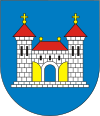Żnin
| Żnin | |||
|---|---|---|---|

Medieval tower of the town hall
|
|||
|
|||
| Motto: Żnin - the open town | |||
| Coordinates: 52°51′N 17°42′E / 52.850°N 17.700°ECoordinates: 52°51′N 17°42′E / 52.850°N 17.700°E | |||
| Country |
|
||
| Voivodeship | Kuyavian-Pomeranian | ||
| County | Żnin County | ||
| Gmina | Gmina Żnin | ||
| Established | Eleventh century | ||
| Town rights | 1263 | ||
| Government | |||
| • Mayor | Robert Luchowski | ||
| Area | |||
| • Total | 8.35 km2 (3.22 sq mi) | ||
| Elevation | 85 m (279 ft) | ||
| Population (2014) | |||
| • Total | 14,181 | ||
| • Density | 1,700/km2 (4,400/sq mi) | ||
| Time zone | CET (UTC+1) | ||
| • Summer (DST) | CEST (UTC+2) | ||
| Postal code | 88-400 | ||
| Area code(s) | +48 52 | ||
| Car plates | CZN | ||
| Website | www |
||
Żnin [ʐɲin] is a small town in Poland with a population of 14,181 (June 2014). It is in the Kuyavian-Pomeranian Voivodeship (previously Bydgoszcz Voivodeship) and is the capital of Żnin County. The town is situated in the historic land of Pałuki and the Gniezno Lake Area on the river Gąsawka.
The name originates from the Polish word "żnieja", meaning harvest or a harvester. During World War II, Żnin's name was "Dietfurt".
The area was known in Roman times, especially the nearby fortification of Biskupin, a Lusatian culture site known as the "Polish Pompeii". Biskupin was an early Iron Age Hallstatt C fortified settlement of about 800-1000 people in the Warta River valley circa 800-650 and 650-475 BC.
By 1030 the area was included within the Archbishopric of Gniezno. The first mention of Żnin is in the Gniezno papal bull issued on 7 July 1136 by Pope Innocent II. The pope granted Archbishop Jacob of Żnin 29 villages in Pałuki and the town of Żnin, which also became property of the Roman Catholic Church.
Żnin was given town rights in 1263 (based on Magdeburg law). In the 13th century the town was given the right of coinage which resulted in its dynamic expansion. Żnin was a major town located on the trade route from Silesia to Gdańsk (the Amber Road). The Teutonic Knights, under command of the Order's Marshal Dietrich von Altenburg, sacked Żnin in 1331. After a few years, the town was rebuilt.
...
Wikipedia



